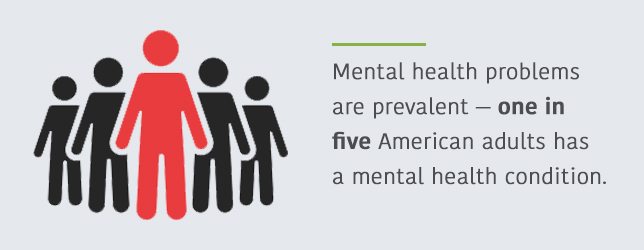Dispelling 8 Common Myths About Mental Illness

Mental illness myths have existed for thousands of years. In the early days, supernatural forces were thought to be the cause of mental health issues. Egyptians, however, were more progressive in their thinking and believed recreational activities like dancing and painting helped relieve symptoms of mental illness. Nevertheless, it would be a long time before human beings developed a greater understanding of mental health.
All throughout history, a stigma has been attached to mental health issues. For example, during the Middle Ages, it was not uncommon for family members to abandon mentally ill loved ones out of shame. Individuals experiencing mental health issues were often beaten, punished or hidden from society.
Although science has advanced substantially since the Middle Ages, mental health issues are still stigmatized today. What is the reason for this? Is it because people fear what they cannot understand? Do we naturally try to avoid the things we fear?
Why Do People Stigmatize Mental Health?
Stigmatizing mental illness allows people to avoid it and keep it separate from themselves. However, more than 40 million Americans have a mental health condition, and there is no reason anyone should ever feel ashamed or afraid to reach out. Understanding mental health issues can help reduce fear and stigma.
According to Oxford English Dictionary, the definition of stigma is “a mark of disgrace associated with a particular circumstance, quality or person.” In other words, a stigma says mental health problems are something to be ashamed of, and that it’s okay for society to discriminate against individuals experiencing mental illness.
As a mental health professional, you know stigmas are not okay. Stigmas make people feel embarrassed, guilty and hopeless. Worst of all, they resist getting the help they need.
Stigmas also hurt healthcare professionals because they prevent employees from seeking treatment for their own mental health problems. Behavioral health professionals have the responsibility to reduce stigma as much as possible for both their patients and others in the workplace.
The first step to reducing stigma is to replace myths with facts, which we will look at first. Next, we’ll explore ways families can support loved ones who are experiencing mental health issues. With encouragement, compassion and education, we can all work together to reduce stigma and increase our understanding of mental health.
8 Common Myths and Facts About Mental Illness
There are many misconceptions about mental illness which ultimately harm the ones experiencing mental health issues. Here are some of the most common mental illness myths, followed by the facts that dispute them:
- Mental Health Issues Are Uncommon: Mental health problems are prevalent — one in five American adults has a mental health condition.
- Children Cannot Experience Mental Health Issues: Children can show signs of a mental health condition at a very young age. Rates of severe depression among youth are increasing, having gone up from 5.9 percent in 2012 to 8.2 percent in 2015. Sadly, 76 percent of youth do not receive the treatment they need.
- People With Mental Health Issues Are Violent: Most people with mental health issues are not violent. In fact, mental health problems are related to less than three to five percent of all crimes.
- People With Mental Health Issues Cannot Hold a Job: Many believe people with mental health problems cannot handle job-related stress and therefore cannot hold down a job. Unfortunately, this stigma prevents people from believing in themselves and causes workplace discrimination. People with mental health problems are just as productive, motivated and punctual as other workers.
- People With Mental Health Problems Are Weak: It is often assumed that people experiencing mental health issues can “snap out of it” if they try, but this thinking is harmful and false. Many different factors contribute to mental illness, including biological factors, past traumatic experiences and a family history of mental health issues.
- People With Mental Health Problems Cannot Recover: Mental health conditions are treatable, and many people recover entirely with the right therapy, support and medication. For example, different types of psychotherapy have been shown to help individuals with depression, anxiety and obsessive-compulsive disorder significantly.
- Friends and Family Are Not Able to Help a Loved One With Mental Health Problems: In reality, friends and family can have a substantial influence on a loved one’s life when it comes to mental health, and their support is invaluable. Often, people feel alone with their mental health issues, and they might choose to isolate themselves from others. Although friends and family cannot force someone to go to therapy or take medication, they can reach out and offer emotional support.
- Mental Health Issues Cannot Be Prevented: While there is no definite way to prevent mental health problems, there are ways to reduce the risk of developing mental health issues. By knowing the warning signs and risk factors, such as childhood trauma or abuse, mental health disorders can be prevented by seeking help right away. For this reason, it’s important not to ignore warning signs in children and help them find treatment, especially if they have experienced trauma.
How Can We Dispel Myths About Mental Illness?
Mental illness myths have a negative impact on society as a whole, but fortunately, there are ways to educate ourselves and each other so we can dispel these myths for good.
We can aid people who believe mental health myths by helping them to gain an understanding of the facts, and by encouraging a supportive approach to mental illness. Even in situations where the damage has already been done, it is never too late to rebuild relationships based on love, trust and open communication. Friends and family members of individuals experiencing mental health conditions also need to know it is never too late to receive treatment, and there is always hope.
Here is some advice to give patients, friends and family members who may believe mental illness myths:
- Practice Critical Thinking: Question the sources you get your information from about mental health issues. A lot of the times the media provides false information because they want to give the audience the most shocking details and provide entertainment. Only trust reliable sources and know that everyone’s experience with mental health issues is unique.
- Connect With People Experiencing Mental Health Issues: Spend time with others who are experiencing mental health issues in the community, and you will learn they are not the stereotype you may have seen portrayed in the media.
- Encourage Open Communication About Mental Health: Whether in the workplace or at home, encourage open discussion of stress and treatment. Approach those who are seeking help with a positive attitude and work to reduce the stigma.
- Educate Ourselves and Others: Learn about mental health illness and everything a loved one may be experiencing. Listen to other peoples’ experiences with mental illness. Knowledge is the most powerful tool in dispelling myths.
- Be Mindful of Language: Choose your words carefully, because they matter a lot. Strive to be accepting and respectful at all times.
- View Physical Illness and Mental Illness as Equal: Consider how you would speak to a loved one if they had cancer or heart disease — you would likely treat them gently and express concern. Mental illness is a real medical problem, and although it is treatable, it is not something that magically goes away. Learn the facts before making assumptions.
- Show Compassion: Understand your loved one is experiencing pain associated with mental health issues, and the last thing they need is to feel ashamed or guilty about their problems. Approach them with compassion and a willingness to help. Let them know you are there for them, and take this same attitude with you everywhere you go.
- Contact the Media When They Stigmatize Mental Health Issues: If you notice a news source, TV show or magazine portraying stereotypes, relaying inaccurate information or mocking mental health issues, do not be afraid to write to them and point out the stigma they are reinforcing.
- Use First-Person Language and Avoid Slang: In other words, instead of saying someone is depressed or anxious, which makes it sound like they are their condition, say they have depression or have anxiety — separate the person from the issue. And of course, you should always avoid offensive words like “psycho” or “crazy.”
How Can Friends and Family Offer Support?
Sometimes, friends and family are unaware a loved one is experiencing a mental health problem. Before they can offer their support, they need to be able to recognize the signs of mental illness. Although every disorder has its own symptoms and everyone experiences symptoms differently, here are some common signs to look for that may signal a mental or behavioral health issue:
- Excessive fear, worry, sadness or crying
- Difficulty concentrating, thinking or learning
- Extreme mood changes
- Prolonged anger or irritability
- Withdrawing from others
- Trouble relating to others
- Feeling tired all the time
- Changes in sleep habits, eating habits and sex drive
- A lack of insight into their feelings or behavior
- Drug or alcohol abuse
- Physical symptoms such as headaches or stomach pain without apparent causes
- Suicidal thoughts
- Inability to perform daily activities or handle stress
- Preoccupation with weight gain or physical appearance
Friends and family may feel helpless or unsure of ways they can help a loved with mental health issues. However, there are plenty of ways they can offer support and help a loved one get the treatment they need. Here are some things they can do:
- Help Them Find Treatment: Sometimes, a loved one feels overwhelmed by treatment options, unmotivated to get help or ashamed of their issues. Research treatment options and encourage them to seek help. Assist them with making the first step by connecting them to resources and reminding them treatment works.
- Express Your Support: Don’t be afraid to show your concern and let them know you want to help them recover.
- Communicate: Spend time with a loved one asking questions, discussing mental health and listening to their concerns, ideas, fears and dreams.
- Offer to Help With Tasks: Your loved one might be experiencing difficulty keeping up with everyday chores — offer to help them reduce their workload while they focus on getting better.
- Make Them Feel Included: It is not uncommon for someone experiencing depression or anxiety, for example, to turn down invitations to parties, events or other social gatherings. Continue to invite them nevertheless and do not pressure them to go if they do not wish to. By including them in your plans, they will feel loved and cared for even if they choose to stay home.
- Educate Other Friends or Family Members: Learn about your loved one’s issues and respectfully share your knowledge with others to prevent discrimination.
- Be Empathetic: It might not always be easy living with someone who is experiencing mental health issues, however, put yourself in their shoes no matter how frustrated or helpless you may feel at times. Treat them with love, respect, compassion and empathy, and always keep hope in mind.
- Ask What You Can Do: Do not assume you know what to do for your loved one, and don’t be afraid to ask them how you can help. Also, resist putting too much on yourself and be honest about what you can help with.
- Take Care of Yourself: Helping someone you love with mental health issues can take a toll on your emotions. Make sure to seek counseling for yourself or consider joining a support group. Do not neglect your own mental health while helping someone you love.
- Have Realistic Expectations: Recovering from a mental health issue does not happen overnight. The process takes time, effort and there may be setbacks. Accept this reality and let your loved one know you are there for them no matter what.
Friends and family need to know they can help their loved ones get the best care possible by learning everything they can about mental health and available treatment options. Suggest contacting local resources or their insurance provider to head in the right direction.
How Can Behavioral Health Professionals Dispel Myths?
Behavioral health professionals have the responsibility of creating an environment that supports recovery and well-being. Mental illness myths can be a hindrance to a patient’s recovery. A patient’s family members, the patients themselves and other healthcare workers are all susceptible to believing myths.
What can you do to dispel myths in your practice? First, make accurate information accessible to everyone in the workplace, from patients to coworkers. Have educational materials on hand in the form of pamphlets, posters or videos. Educate those around you about the facts and let it be known that you do not tolerate discrimination.
By stigmatizing mental illness, everyone is affected. Patients may discontinue treatment, or healthcare professionals may avoid seeking help. Promote a help-seeking attitude throughout the workplace, so everyone feels comfortable discussing mental health. As a result, everyone will be in a better position to provide the best care.
How ICANotes Can Help With Dispelling Myths About Mental Illness
Another way to help your patients recover and benefit from an overall better patient experience is through ICANotes Behavioral Health EHR software. Our premium patient portal allows you to text or email appointment reminders to help patients stay on schedule with their recovery, and also keeps their information organized, secure and readily accessible.
With ICANotes, documentation is quick and easy, so you’ll be able to spend more time providing excellent patient care and less time filling out paperwork. For more information, contact ICANotes, learn more with a live demo or request a free trial to get started today.




